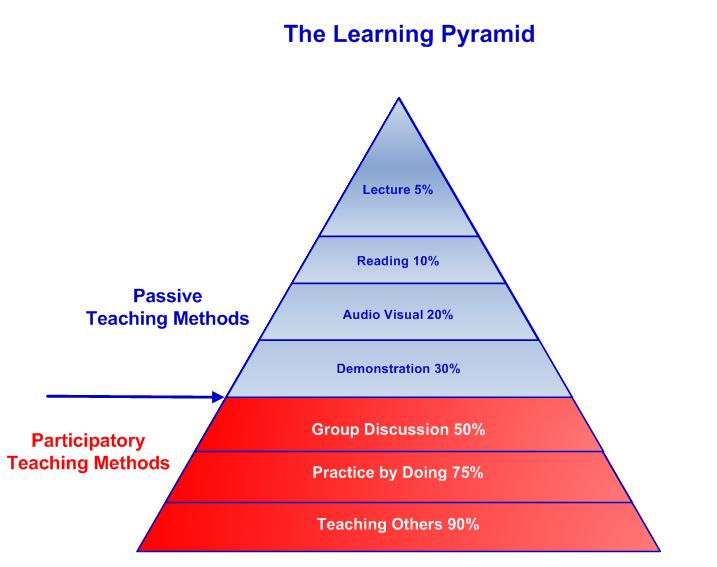How to better remember the material you study
Although we’d all love to remember everything we study, the reality is that we manage to forget a lot of things (see last’s week’s blog post to find out why we forget things). So, how can we maximize our study time before tests or exams, or in general throughout the school year?
One concept, called the Learning Pyramid, shows us that different learning/teaching methods help us retain information better than others. The most important implication of the Learning Pyramid is that participatory learning/teaching methods are more effective than passive learning/teaching methods.

According to the Learning Pyramid, learners retain approximately:
- 90% of what they learn when they teach someone else or use the knowledge immediately
- 75% of what they learn when they spend time practicing what they’ve just learned
- 50% of what they learn when they study in groups
- 20% of what they learn from audio-visual stimuli
- 10% of what they learn from reading about a subject
- 5% of what they learn from a lecture
Since most typical in-class teaching methods result in students retaining less than one-third of the information circulated via lectures, demonstrations, audio-visual sessions, and reading material, it’s no wonder students are turning to other supplemental study methods to improve their grades.
So, why do we remember significantly more when from teaching someone else or from practicing it immediately? There’s a really good explanation for this: when you are given opportunities to make mistakes, your brain engages on a deeper level and learns more effectively because it’s required to concentrate on fixing the mistake. When your brain receives abstract concepts through lectures or reading, you aren’t provided with the same opportunity to test your knowledge and you’re not pressed to concentrate to the same degree, so you retain less information.
For example, sitting at home and reading a chemistry book won’t help you learn concepts as well as a group discussion about those same concepts would. Try for yourself – sit down with a book and try to teach yourself something for an hour. See how much you can recite after your hour of reading. Not so easy, is it? This is because you must take time to allow for mistakes and to correct them.
How to maximize your study time
To retain the most information over time, it’s vital to supplement your in-class learning with participatory learning methods. Here are some ideas on how you can do just that:
1) Organize group study sessions with classmates. These types of sessions will allow you to teach one another and build an informed understanding of the material you’re covering. Group sessions can incorporate group discussions, practice by doing, and teaching others – all learning methods that produce better retention of information.
2) Embrace opportunities to conduct class presentations. Although speaking in front of your peers may be an intimidating concept for many of us, the process of researching, preparing for, and presenting in class is a process that will yield incredible results!
3) Study with a tutor. This might seem like a biased opinion, since this is an online tutoring website and all, but it’s been proven that one-on-one learning is the most effective way to improve your grades. Working with a tutor in a one-on-one setting is so much different from listening to a teacher in a classroom environment. With a tutor, you’re able to have discussions, practice by doing as you go, make mistakes and correct them, and reiterate concepts to your tutor. Skooli’s online tutoring classroom even automatically records all sessions and allows students to re-watch them from their dashboard! (Try out the classroom here!)
Tips for students from Skooli’s online tutors: When you’re connecting with your tutor, make the learning process a two-way street. Take time to absorb new concepts, ask for questions to challenge your understanding, and then try to re-teach concepts to your tutor to allow them to check your level of understanding. This way, you’ll be more likely to retain 90% of what you’ve just learned – and you’ll be engaging in the most effective way of learning. Real learning will come from the opportunities that you give yourself to make mistakes when you are trying to implement your new learning.

